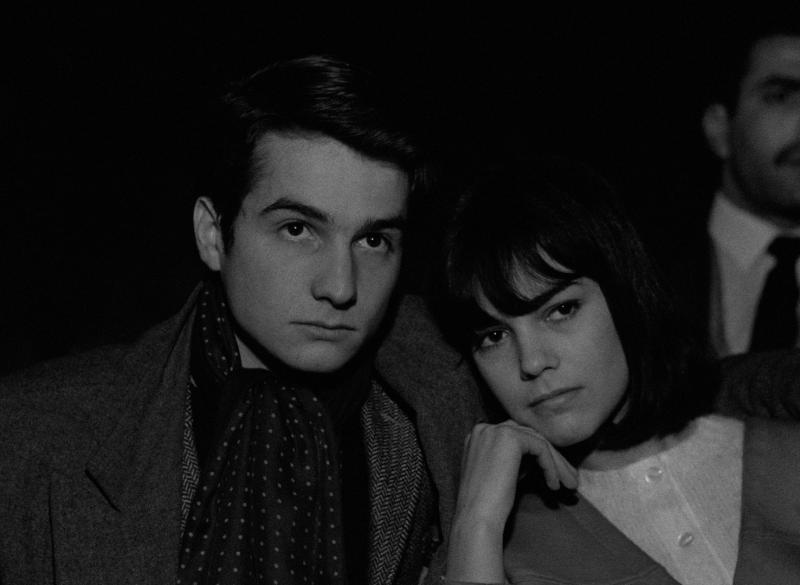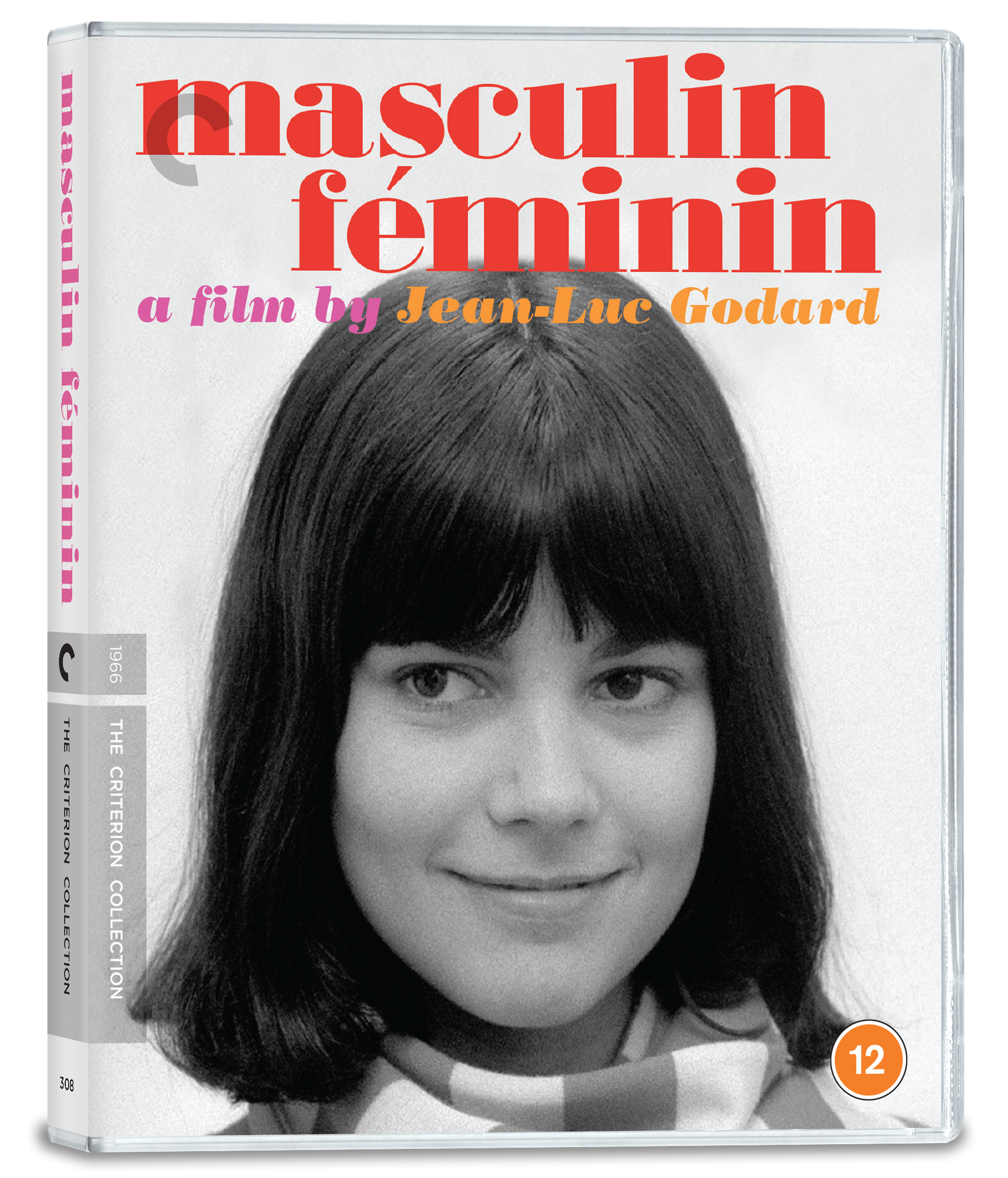Blu-ray: Masculin Féminin | reviews, news & interviews
Blu-ray: Masculin Féminin
Blu-ray: Masculin Féminin
Godard's playful and philosophical cinema

Jean-Luc Godard’s film-making career, a restless quest for a cinema that questions the medium as well as its place in the social and political context, is both astonishingly prolific and unique.
Although very loosely inspired by two Maupassant short stories, this is a film without clear narrative. From early on Godard had rebelled against the conventions of Hollywood cinema. His philosophical films derive an almost perverse strength from the art of the non sequitur, constantly undermining the audience’s expectations and demanding reflection rather than compliance and escape. Films like Masculin Féminin, as his former collaborator the academic Jean-Pierre Gorin, explains in one of the illuminating extras on this Criterion release, are above all essays, in the style of one of Godard’s favourites, the French writer and philosopher Montaigne. The film explores the behaviour and attitudes of French youth on the cusp of adolescence and adulthood, between potentially creative disorientation and the comfort of certainty. But also – and here Godard demonstrates how much in touch he’s always been with the Zeitgeist of his time – this is a generation shaken up by the Algerian war of independence and the first phase of the Vietnam war. These are the young who will soon be making barricades of the cobble stones in the Paris boulevards.
Narrative cinema works within the comfort zone of a linear plot. In so far as this film has a plot, it's mostly about the rather adolescent romance between Paul (Jean-Pierre Léaud) and Madeleine (Chantal Goya). Godard works with the discontinuities of real life – exaggerating them at times to create effect, and to jolt the audience out a passive compliance. The only predictable element in Godard is the almost surreal unexpected: in Masculin Féminin, for instance, a wife murdering her husband outside the café where they have been arguing, as Paul and Madeleine look on fascinated and perplexed.

As the actress and pop singer Chantal Goya (Madeleine) explains in an enchanting bonus interview, Godard played with the space between actor and character. For Godard the make-believe at the heart of cinema is always brought in question. He worked, as she explains, with a mixture of strong direction and improvisation – casting his actors with intuitive flair, for their own stories. This would produce material that was never scripted. In the case of Paul, the film’s main character, he chose Jean-Pierre Léaud, Truffaut’s alter ego as “Antoine Doinel” in a series of autobiographical films, starting with Les 400 coups (The 400 Blows) in 1959.
This reference – Paul at one point claims the name "Doinel" – is characteristic of a film which asks, over and over, questions about cinema’s relationship to the truth. The film consists, indeed, of a series of questions: Paul and his friend Robert, with whom he's engaged in minor anti-American "actions", submit the young women in the film to a barrage of questions about sex and politics. Paul gives up his job as a journalist and starts to work as a pollster. once again asking questions.
The young women – girls really – are more hedonistic, not as concerned with the Vietnam war or other contemporary events. Madeleine records typically French yé-yé pop songs, with an American producer. As one of the film’s frequent titles announces, the young people at the heart of the film are “the children of Marx and Coca-Cola". The obsession with asking questions comes from a sense of disorientation and alienation, which Godard recognises as an expression of the times, caught as they were then (as today's youth still are) between slavish consumerism and idealistic radicalism. Godard was a remarkably prescient film-maker, always on the edge, taking creative risks inspired by strong intuitions concerning the way society was moving. Masculin Féminin is also a remarkable document of its time, as well as a period piece, with women discussing contraction and abortion at the dawn of the sexual revolution of the 1960s, as well as tuning into the mood that would explode in 1968.
Flirting with ideas about revolution, the film is also characterised by a certain pessimism – perhaps the melancholy shadow that often accompanies radical idealism. Suicide is very present: a man stabs himself in the stomach for no apparent reason, another self-immolates himself off stage, and Paul throws himself from the window of a high-rise building (both "off-stage" in the style of Greek tragedy).
Of the directors who had sharpened their critical teeth on Cahiers du Cinéma, Godard is probably the most concerned with film theory. Masculin Féminin isn't just a piece of pop sociology, but an essay in film theory, often playful, but at times a little tiresome, as if Godard were trapped in his own need to constantly deconstruct, an almost adolescent addiction to rebellion and questioning of accepted values and behaviours. Melancholy and alienated, and yet idealistic and romantic, Paul – never far from the Antoine Doinel made iconic in Truffaut’s films by Léaud – kills himself. Godard attempted suicide twice himself. His films may not be overtly autobiographical, but Masculin Féminin reflects something essential to the director – like a hologram that concentrates essence within a single multi-dimensional work of art.
Godard reveals in this hymn to teenage spirit a deep affinity with revolt that runs through all his films. He grew up in the comfort of the French and Swiss haute-bourgeoisie. The vitality and vibrancy of his films comes from a perpetual questioning, and yet reflects as well a psychology caught in an atttitude of rebellion, or as the French would put it 'la contestation'. He is, in this respect, the most French of the directors of his generation.
rating
Explore topics
Share this article
The future of Arts Journalism
You can stop theartsdesk.com closing!
We urgently need financing to survive. Our fundraising drive has thus far raised £49,000 but we need to reach £100,000 or we will be forced to close. Please contribute here: https://gofund.me/c3f6033d
And if you can forward this information to anyone who might assist, we’d be grateful.

Subscribe to theartsdesk.com
Thank you for continuing to read our work on theartsdesk.com. For unlimited access to every article in its entirety, including our archive of more than 15,000 pieces, we're asking for £5 per month or £40 per year. We feel it's a very good deal, and hope you do too.
To take a subscription now simply click here.
And if you're looking for that extra gift for a friend or family member, why not treat them to a theartsdesk.com gift subscription?
more Film
 Beating Hearts review - kiss kiss, slam slam
Romance and clobberings in a so-so French melodrama
Beating Hearts review - kiss kiss, slam slam
Romance and clobberings in a so-so French melodrama
 Materialists review - a misfiring romcom or an undercooked satire?
Writer-director Celine Song's latest can't decide what kind of film it is
Materialists review - a misfiring romcom or an undercooked satire?
Writer-director Celine Song's latest can't decide what kind of film it is
 theartsdesk Q&A: actor Leonie Benesch on playing an overburdened nurse in the Swiss drama 'Late Shift'
The Guildhall-trained German star talks about the enormous pressures placed on nurses and her admiration for British films and TV
theartsdesk Q&A: actor Leonie Benesch on playing an overburdened nurse in the Swiss drama 'Late Shift'
The Guildhall-trained German star talks about the enormous pressures placed on nurses and her admiration for British films and TV
 Freakier Friday review - body-swapping gone ballistic
Lindsay Lohan and Jamie Lee Curtis's comedy sequel jumbles up more than their daughter-mother duo
Freakier Friday review - body-swapping gone ballistic
Lindsay Lohan and Jamie Lee Curtis's comedy sequel jumbles up more than their daughter-mother duo
 Eight Postcards from Utopia review - ads from the era when 1990s Romania embraced capitalism
Radu Jude's documentary is a mad montage of cheesy TV commercials
Eight Postcards from Utopia review - ads from the era when 1990s Romania embraced capitalism
Radu Jude's documentary is a mad montage of cheesy TV commercials
 The Kingdom review - coming of age as the body count rises
A teen belatedly bonds with her mysterious dad in an unflinching Corsican mob drama
The Kingdom review - coming of age as the body count rises
A teen belatedly bonds with her mysterious dad in an unflinching Corsican mob drama
 Weapons review - suffer the children
'Barbarian' follow-up hiply riffs on ancient fears
Weapons review - suffer the children
'Barbarian' follow-up hiply riffs on ancient fears
 theartsdesk Q&A: filmmaker Dag Johan Haugerud on sex, love, and confusion in the modern world
The writer-director discusses first-love agony and ecstasy in 'Dreams', the opening UK installment of his 'Oslo Stories' trilogy
theartsdesk Q&A: filmmaker Dag Johan Haugerud on sex, love, and confusion in the modern world
The writer-director discusses first-love agony and ecstasy in 'Dreams', the opening UK installment of his 'Oslo Stories' trilogy
 Oslo Stories Trilogy: Dreams review - love lessons
First love's bliss begins a utopian city symphony
Oslo Stories Trilogy: Dreams review - love lessons
First love's bliss begins a utopian city symphony
 Blu-ray: Two Way Stretch / Heavens Above!
'Peak Sellers': two gems from a great comic actor in his prime
Blu-ray: Two Way Stretch / Heavens Above!
'Peak Sellers': two gems from a great comic actor in his prime
 Late Shift review - life and death in an understaffed Swiss hospital
Petra Volpe directs Leonie Benesch in a compelling medical drama
Late Shift review - life and death in an understaffed Swiss hospital
Petra Volpe directs Leonie Benesch in a compelling medical drama

Add comment